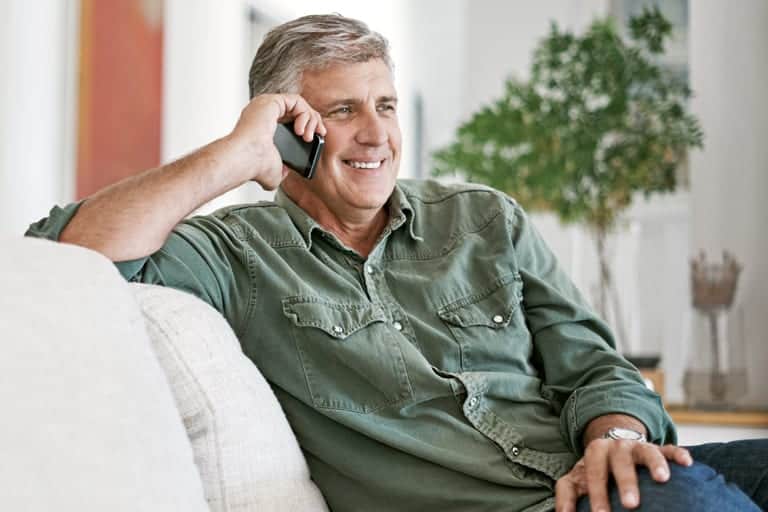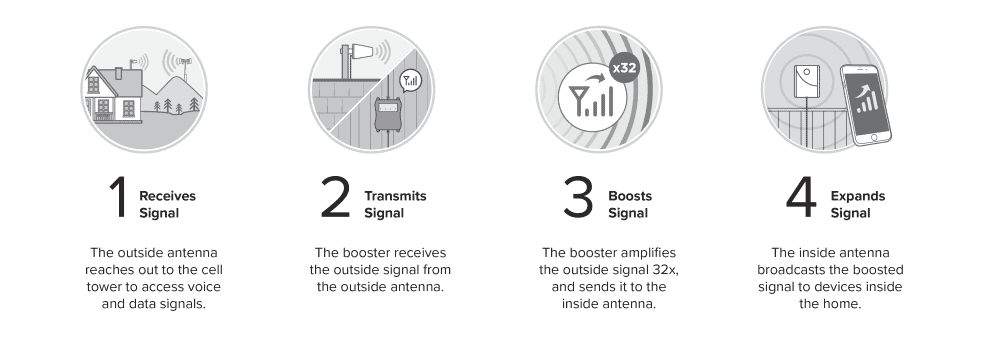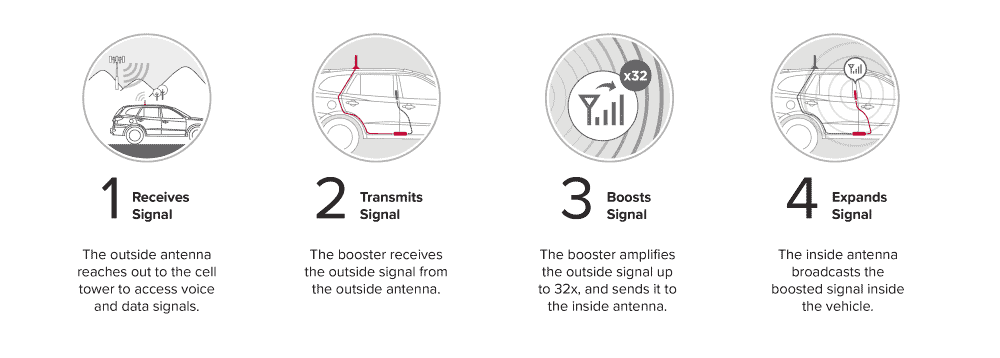Blog
How to Improve Poor Cell Signal
July 10, 2023 — by MEREDITH POND
SHARE ARTICLE[Sassy_Social_Share total_shares="ON"]
Although cellular networks are increasing coverage across the nation, many of us still need to improve poor cell signal. We frequently deal with spotty signals or dead zones. Calls drop in certain areas of our homes. We miss texts sent while we’re traveling along certain routes. Our internet lags so we can’t stream the shows we want to watch.
Getting and maintaining a solid connection is increasingly imperative for our daily lives. Thankfully, disruptions in connectivity don’t have to plague you any longer. To improve poor cell signal, it’s important to understand how cell signals work, what causes poor reception, and what you can do about it.
How do cellular signals work?
Cellular networks use cell towers to broadcast radio frequency signals, which your cell phone or mobile device picks up with an antenna. The signal strength is typically stronger the closer you are to a cell tower. However, obstructions such as buildings, terrain, or weather conditions can scatter, absorb, or block the signals — weakening them even in urban areas.
Rural and remote locations have fewer cell towers, so people in these places depend on signals from far away. Unfortunately, signals weaken as they travel. The combination of distance and other obstructions often creates a seemingly insurmountable barrier to consistent cellular coverage.
Easy ways to improve poor cell signal
You can improve cell signal almost immediately in several ways:
1. Conserve your battery
Your phone’s battery consumes power as it tries to connect to the closest cell tower. When the battery is low, the phone goes into a power-conserving mode which reduces the energy available to find a signal. As a result, it’s difficult to get and keep good reception when your phone is drained. Keep a portable battery charger handy for extra juice in a pinch.
Leaving apps on in the background can suck the life out of your phone and limit your cell reception. Turn off the Near-Field Communication (NFC), navigation, and Bluetooth until you need them. Keep push notifications off, except for urgent apps. This minor inconvenience leaves more energy for your battery to maintain your cellular connection, which can help improve poor cell signal.
2. Start over
Your phone may pick up cell signals better once it has a chance to reboot. This can let your phone receive the latest software updates. It can also fix glitches in software that occur when antenna signals hop from one tower to a closer one.
3. Fix “voice & data”
Some areas have a stronger 4G or LTE signal, while others may have better luck with 5G, depending on the closest cell towers. You might be able to improve poor cell signal by changing the “Voice & Data” option on your phone to see what works best where you are.
4. Clean the SIM card
Dust and dirt buildup within your phone could be responsible for a poor connection. If possible, remove your SIM card and wipe it gently with a dry cloth. Reinsert, avoiding exposure to moisture.
5. Switch up your surroundings
Metal appliances and solid furniture in your space may block cell signal. Overgrown trees and bushes may also affect your reception. Consider rearranging or trimming down these items so that they don’t obstruct the path of the outside signal.
6. Open your windows
Low-emissivity glass and other LEED-certified materials act as barriers to UV rays and heat transfer, but they also keep cell signals from entering buildings. Insulation and certain paints can also hinder reception. If you can open a window, then you may be able to improve poor cell signal strength.
7. Catch it outside
Replacing building materials that block cellular reception is probably not a feasible option. But simply stepping outside your home or office can at least help temporarily. As with the above option, this is only feasible if weather and time permits. It’s definitely not a permanent solution like weBoost is, but it might help in a pinch.
A cell phone booster can improve poor signal
Despite your efforts, it’s possible that the cell signal in your area is just too weak to serve your mobile devices in a way that works for your life. You need a cell phone signal booster to permanently fix your problem. You’ll no longer have to go upstairs, near the window, or outside because you’ll have a stronger signal all around. If you’re traveling, a vehicle cell booster can eliminate dead zones on the road, too.
The Federal Communications Commission (FCC) approves signal boosters as cost-effective enhancements to wireless service. Most wireless carriers permit consumers to operate FCC-approved boosters as well. weBoost amplifiers meet FCC standards and work with all carriers and mobile devices.
How cell phone signal boosters work
A cell phone signal booster uses antennas and an amplifier to capture cell signal outside a building or vehicle. The system strengthens the signal and then redistributes it inside your home or vehicle. This gives consistent coverage for everyone and their devices within the space.
How a cell signal booster works in homes
How a cell signal booster works in vehicles
weBoost users experience significant improvements in voice quality, data speeds, and overall connectivity.
A signal booster offers these benefits as well:
- Fewer missed texts and dropped calls
- Reduced “dead zones”
- Better streaming
- Extended battery life on mobile devices
- Optimized use of unlimited data plans
Cell phone signal boosters vs. femtocells
Femtocells, also called microcells or network extenders, convert an internet connection into cellular signals. They can be costly and incur a monthly fee. They only work for the carrier that provides it, and you’ll need an internet connection for it as well.
On the other hand, cell phone signal boosters are a one-time investment that acts as a network extender. They work with all phone models and carriers and do not require an internet connection, only an existing cell signal. There is no monthly fee or subscription.
The best cell phone signal boosters
These cell signal amplifiers are industry-leading devices that ensure a robust, reliable connection. Our boosters strengthen 3G, 4G LTE, and 5G signal. We offer an extensive line of products for homes, businesses, and vehicles in many types to fit your cellular connectivity needs.
Home Cell Signal Boosters
weBoost cell signal amplifiers are built to strengthen indoor signals within areas ranging from 1,500 square feet to 7,500 square feet. They support multiple devices and users simultaneously across multiple carrier networks. Here’s our current lineup of cell phone signal boosters for home:
- Most compact home booster
- For up to one large room or studio
- Simplest DIY installation
- For up to one room, small home, or apartment
- Easily mountable outside antenna
- Tool-free installation option
- 2nd most powerful home signal booster
- For up to three rooms
- Tool-free installation option
- Most powerful residential cell signal booster
- Ideal for small businesses and large homes
- Professional installation included with the weBoost Installed | Home Complete
Small Business Cell Signal Boosters
weBoost for Business helps small businesses improve poor cell signal in their buildings and fleets. You can choose from self-installed or professionally installed versions.
- Covers up to 15,000 square feet* in an office or other type of building
- Comes with professional installation by our nationwide network of certified pros
- Includes a second inside antenna for better coverage
- Covers up to 10,000 square feet* in an office or other building
- Designed for DIY installation
- Covers up to 8,000 square feet* in an office or other building
- Designed for DIY installation
* Coverage claims are based on estimates and can vary depending on factors such as outside signal strength, building construction, and building layout. Wilson Electronics’ Office products are the best performing cell signal boosters for smaller buildings. For larger buildings exceeding 15,000 square feet, we recommend the WilsonPro product lineup for optimal in-building cell signal performance.
Vehicle Cell Signal Boosters
weBoost boosters are specially designed to provide affordable, consistent coverage for your car, SUV, RV, or truck. Single and multiple users can enjoy reliable cell reception wherever the road leads.
Get the best booster with weBoost
weBoost produces first-in-class cell signal boosters for residential and vehicle use. Our boosters feature Automatic Gain Control that continuously optimizes signal strength. We back each booster kit with a 30-day money-back guarantee and a two-year warranty.
weBoost cell signal boosters:
- Are fully FCC-compliant
- Work with all U.S. and Canadian carriers
- Boost signals within the 700-2100 MHz bands
- Are supported by our U.S.-based support team
- Are designed, built, and tested in the United States
When you purchase a weBoost cell signal booster, you also get a dedicated customer support team that is just a click, call, or email away. Let us help you fix your bad cellular signal — contact us today.
buttonbutton SHARE ARTICLE[Sassy_Social_Share total_shares="ON"]TAGS: How To



